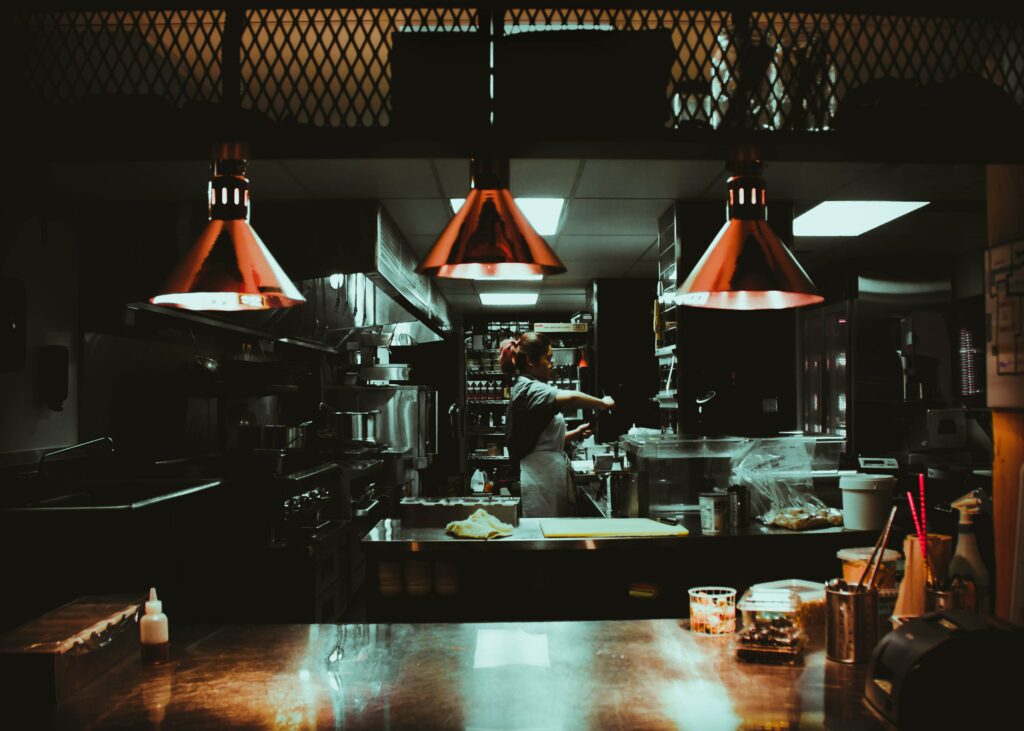Last night, quickly becoming hangry, some friends and I decided to order dinner from Bunch of Dumplings, a restaurant on DoorDash with delicious looking photos of different kinds of dumplings. Because I’m cheap, I offered to drive 15 minutes in the rain to pick up our food, instead of waiting over an hour for delivery.
So I donned my rain gear and drove to the restaurant. When I arrived, I expected a small restaurant with some seating, kitchen and staff, but what I found was a warehouse with a giant “Pick up Food Here” sign pointing to an entrance. Cars were circling the parking lot. Dozens of delivery people were coming and going. I entered the pickup queue and approached an iPad that prompted me to select from which restaurant I was picking up. I selected from a list of 20 restaurants, selected my name and the iPad directed me to a locker location where my food was waiting. Besides seeing other hurried delivery drivers picking up their packages, I had no interaction with another human in the entire process.
If you haven’t heard of this trend, what I visited was a “ghost kitchen.” Restaurants lease kitchen space in a giant warehouse without patron seating. They only sell take out via apps like DoorDash, UberEats and Grubhub. It’s the mass production and centralization of food with all the look and feel of a neighborhood restaurant from a distance. Connection between the restaurant owner, chef and patron is entirely digital, through the delivery app. The connection a typical restaurant has to its neighborhood is non-existent with a ghost kitchen restaurant. If the brand doesn’t perform well, the same anonymous corporation can spin up a new concept in the same space in a short amount of time.
Driving home, I couldn’t help but compare the entire experience to church planting. Yes, church planting.
The traditional church planting model takes what has worked in one location and replicates it in another location. This could mean one thriving church on one side of town funds a church plant on the other side of town without regards to local context or what this new neighborhood actually needs. The playbook is run over and over. It’s the mass production of Christianity.
At Launchpad, we don’t believe in a church planting model and we don’t consider ourselves church planters.
Instead, we coach our Launching Partners to deeply engrain themselves in their local culture, to walk their neighborhoods, to have conversations with local school principals and non-profit directors about what challenges they are facing. Jen and I can’t be experts on your local neighborhood or the people gathered around you, but we can coach you on going slow, sharing leadership, and developing rhythms to listen and lead. We can come along side you in building a just and generous community. We can help you focus on what matters and encourage you to make relationships one face-to-face meeting at a time, whether that’s in the same room or on Zoom.
The community that Dylan is building in Columbia, South Carolina needs to be fundamentally different from the community that Makenzie is leading in Brooklyn, New York. Even the virtual community that Jon has launched has different people showing up for different reasons than the digital community that Shaleen has gathered.
Context matters. Soil matters. This one-size-fits-all version of Christianity is not only problematic on a practical level, it’s deeply problematic on a theological level. And it’s a world I don’t want to inhabit, nor does Launchpad want to perpetuate.
Just the same way as I don’t want my belly to be fed by a faceless corporation in a warehouse, I don’t want my spirit to be fed by copy/paste community. Besides, the dumplings gave me indigestion and left me hungry for something more substantial.

